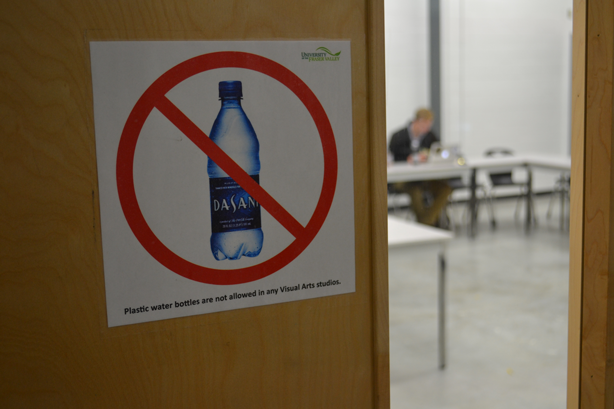Print Edition: October 23, 2013

In 2010, UFV’s visual arts department banned the use of plastic bottles inside their studio classrooms. It was a step in the right direction, but since then we haven’t seen any further progress.
Why have we not joined the likes of the University of Toronto, Concordia, and Vancouver Island University, and banned plastic water bottles on campus?
The U.S. Environmental Protection Agency estimates that out of the 32 million tons of plastic produced in the States per year, only eight per cent finds its way into a recycle bin. In a landfill, plastic takes a minimum of 450 years to break down.
While recycling and reusing is an important step to keeping plastic out of landfills, it’s not as green as one might assume. Sorting and melting down the material for reuse uses massive amounts of energy in itself.
It’s interesting to look at the issue through a psychological lens. Most UFV students are aware to some extent that plastic bottles have a negative effect on our environment. And we would love to think that the self-proclaimed environmentalists would not buy plastic water bottles, just as we would love to think that those same people would generally act in an environmentally conscious way.
In other words, we would love to think our attitudes affect our behaviour.
Yet this isn’t always the case. The relationship between our behaviour and our attitudes is a little more complex than that. People think one way and act another. Attitudes are often not expressed through behaviour because they conflict with social norms, or with each other.
Some of the same people who would describe themselves as environmentally conscious buy plastic water bottles on a regular basis.
In many cases, behaviour itself initiates a change in attitudes, not the other way around.
If attitudes and behaviours change when we are motivated to maintain consistent thought, why not just highlight the inconsistencies many students feel through a new policy at UFV? Ban water bottles and create that social norm.
Outside the visual arts department, UFV has done little to combat the use of plastics. Recycling bins are positioned around campus, where empties are dutifully disposed of; you can buy reusable bottles at the bookstore; and there are two filtered water stations for those who need them on campus.
Changing attitudes is a complicated business. Hoping for people to stop buying plastic water bottles by waiting for them to change or internalize their attitudes is a long process. As far as I’m concerned, we should no longer have the right to purchase a plastic water bottle, because doing so is infringing on other people’s right to a healthy environment.
So let’s skip the whole attitude-changing business and just create social norms around the behaviour. UFV has to take initiative: direct action will yield direct results.
We can say with near certainty that Sodexo won’t suddenly stop selling bottled water. So here’s how UFV could do it: ban plastic water bottles in the classroom. Post signs on classroom doors or have game instructors write on their syllabi that plastic water bottles will not be permitted in their classes. Put up posters. These would result in a two-pronged approach: the posters raise awareness about the negative effects of plastic water bottles that might work to changing attitudes, while attempting to enforce a social norm.
If UFV is serious about being environmentally conscious, it would take the initiative and pull the plug on plastics.


